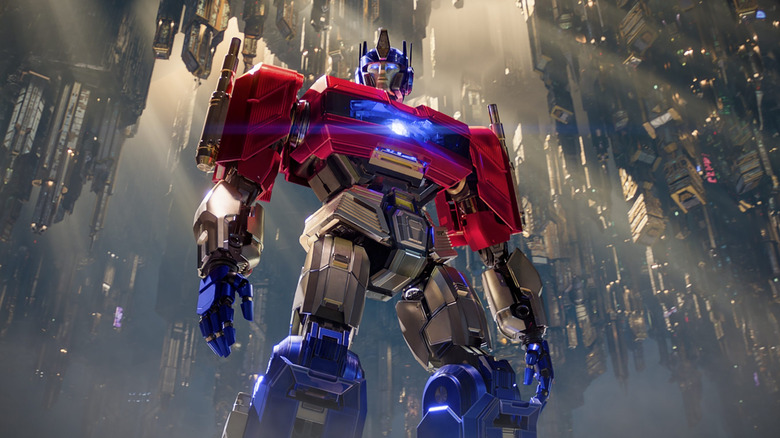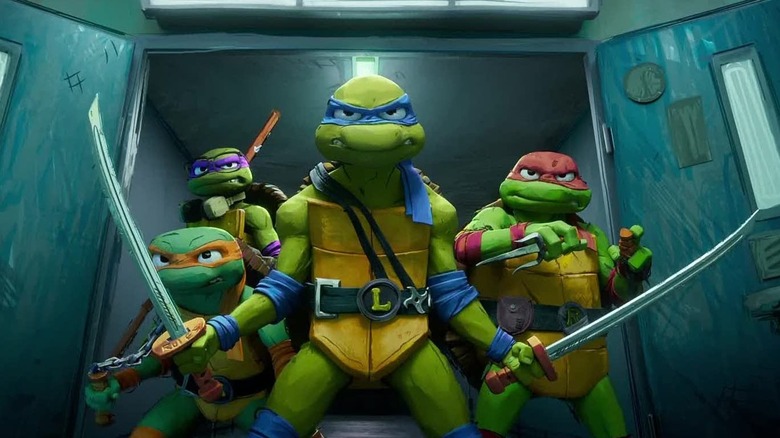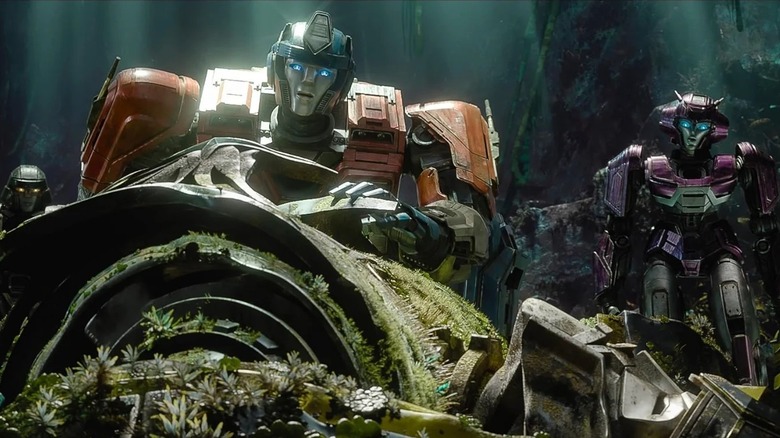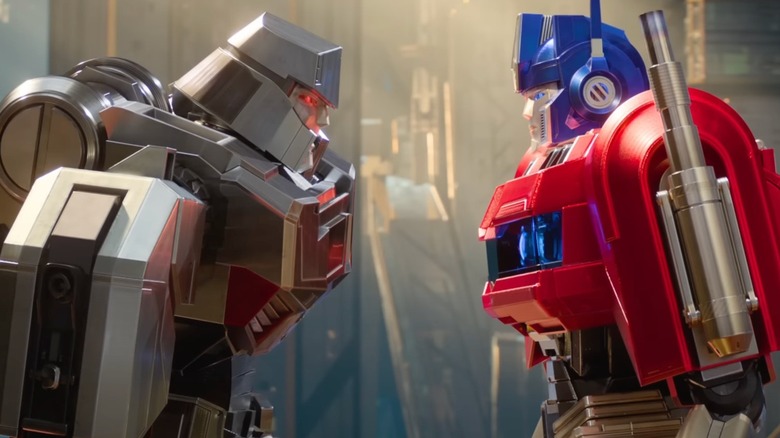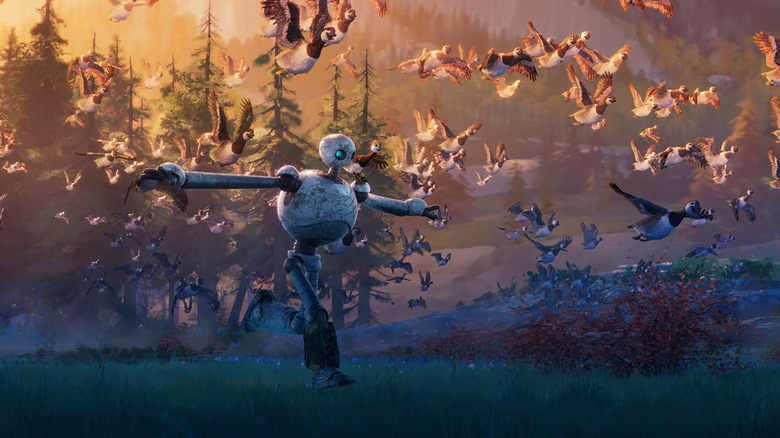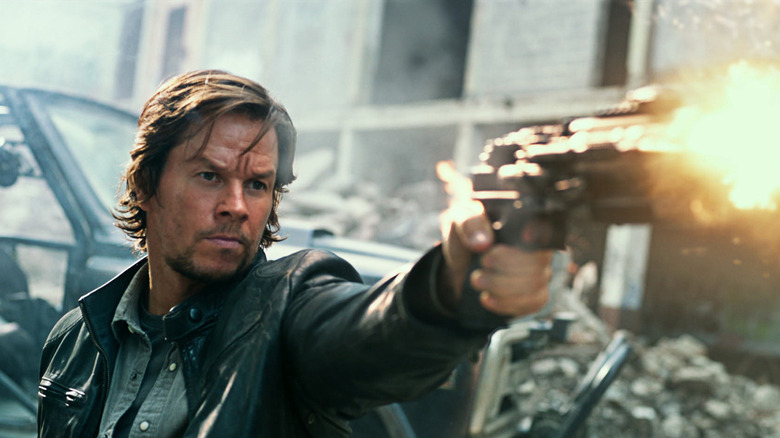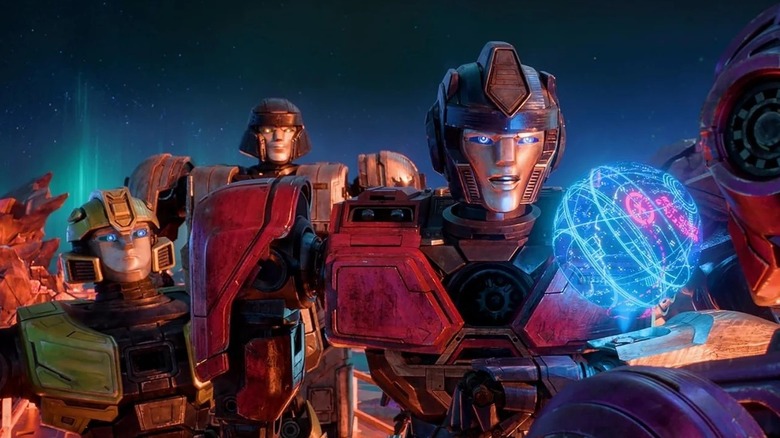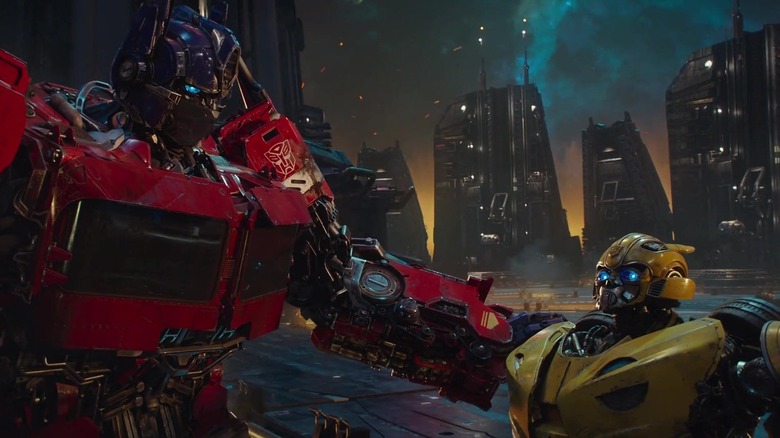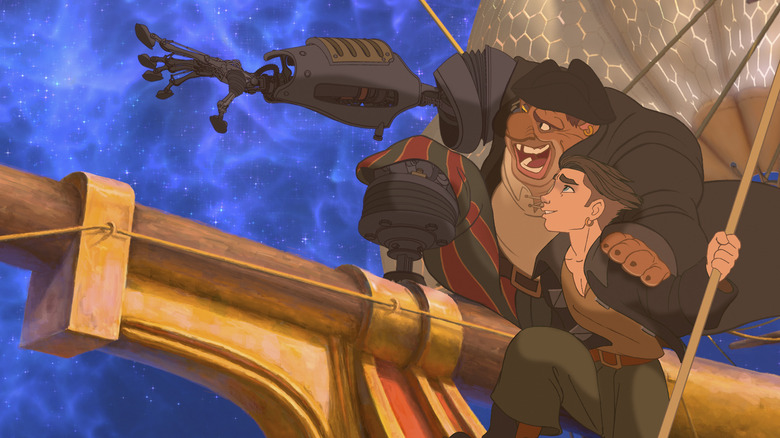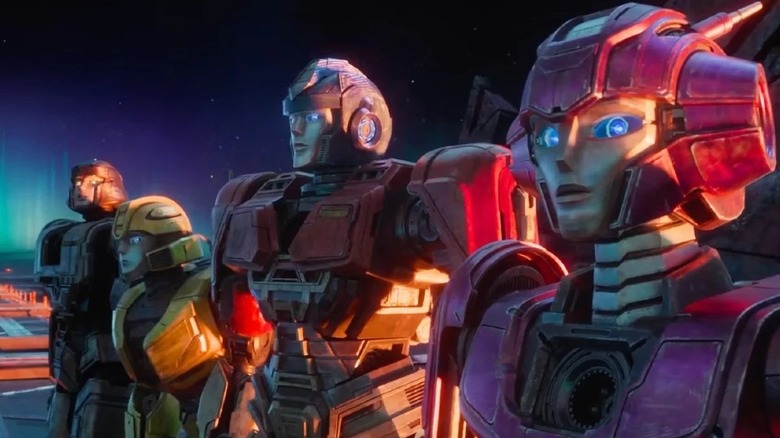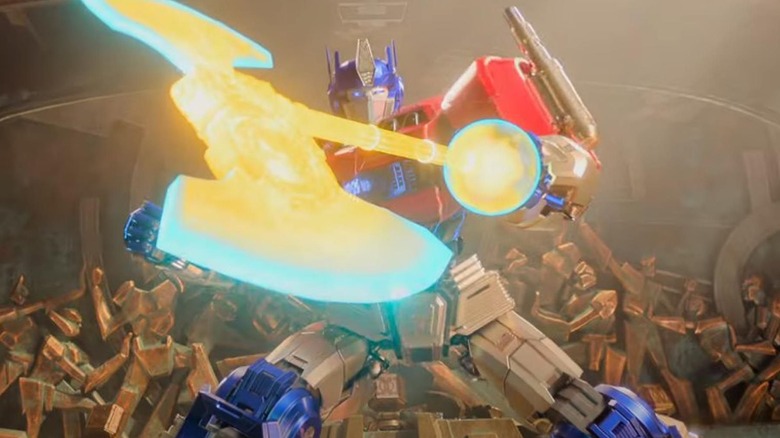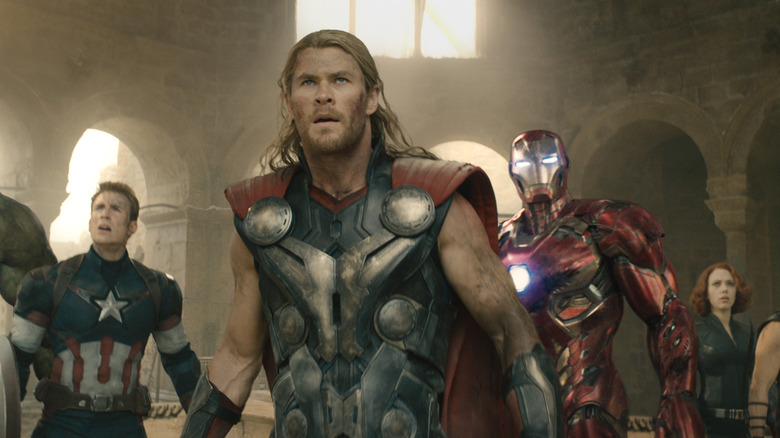Why Transformers One Bombed At The Box Office
In 2014, "Transformers: Age of Extinction" was the No. 1 movie of the year worldwide by a significant margin. With a massive $1.1 billion globally, "Age of Extinction" scored a staggering haul that suggested this franchise could run forever. A decade later, this same saga is now experiencing one of its most crushing financial blows. "Transformers One," despite having a terrific critical reception, only grossed $25 million over opening weekend. That debut put it firmly behind both financial expectations and the third domestic weekend of "Beetlejuice Beetlejuice". Among the box office outcomes for September 2024 franchise titles, it's clear why "Beetlejuice Beetlejuice" blew everyone away at the box office. It's far murkier why "Transformers One" missed industry projections to gross as much as $40 million over its opening weekend so badly.
Now that "Transformers One" has joined the ranks of sci-fi box office bombs that are actually worth watching, one has to ask, what went wrong here? Why was this the title that led to the broader saga running out of box office steam? There are many reasons why audiences gave "Transformers One" the cold shoulder. Its prequel storyline catered just to die-hard "Transformers" fans, sci-fi animation has always been a tough sell for family audiences, and Chris Hemsworth is not a box office draw. These are just some of the many factors that led to "Transformers One's" box office demise. The days of "Age of Extinction" ruling all over movies globally are a distant memory with these "Transformers One" numbers.
Paramount's erratic animated movie box office track record
When an Illumination or Pixar feature hits theaters, the expectation is that it's guaranteed to be a moneymaker. Unfortunately, not every animation studio is so lucky. Case in point: "Transformers One" distributor Paramount Pictures. The studio's various homegrown animated movies over the years have had an erratic box office track record that includes a deeply worrying box office bomb. Sure, the company's responsible for lucrative features rooted in familiar IPs. The movie adaptations of famous kids' TV shows "SpongeBob SquarePants" and "Paw Patrol" have become reliable moneymakers. Then there's "Teenage Mutant Ninja Turtles: Mutant Mayhem," which was a late summer 2023 hit critically and a decent performer financially.
However, Paramount also has a bevy of animated flops under its belt. In the late 2010s, "Sherlock Gnomes" and "Wonder Park" both became costly financial misfires despite launching in prime mid-March release dates. In July 2022, "Paws of Fury: The Legend of Hank" continued its troubles with animated features at the box office. Part of the problem has been that Paramount doesn't release new animated movies on a super-frequent basis. That's ensured the studio hasn't developed consistently successful marketing techniques or release dates to aid each new release. It's possible for a movie with "Mutant Mayhem"-level buzz to overcome Paramount's animated movie doldrums. However, "Transformers One" didn't quite have enough of the touch or power to secure a box office haul defying box office standards for animated Paramount titles.
The Transformers aren't as popular as they once were
The days of 2011 when a "Transformers" installment could crack $350+ million domestically easily are firmly in the past. Since 2014's "Transformers: Age of Extinction," the movie series has been on life support. 2017's Money-loser "Transformers: The Last Knight" grossed over $600 million worldwide, yet lost over $100 million for Paramount. That alone should've signaled to the studio that the saga had lost its luster for the general public. Yet three more titles (including "Transformers One") hit theaters in the following years. Most worryingly, the "Transformers" franchise took a box office dip with "Rise Of The Beasts" in 2023. That feature made only $281.9 million internationally, an anemic gross for a saga that once grossed $500+ million overseas without cracking a sweat.
Despite the reality that the "Transformers" movies just aren't mega-hits anymore, Paramount's dearth of other big franchises led the studio to continue placing all its chips on the saga. Heck, a crossover movie between "G.I. Joe" and "Transformers" starring Chris Hemsworth is hurrying towards existing. However, the terrible opening weekend of "Transformers One" demonstrates that this saga is not an eternal source of revenue. In fact, 10 years after "Transformers: Age of Extinction," the franchise has really left everyone behind, except for die-hards of the original property. The Autobots have overcome many enemies over the years, but even they are powerless in the face of audience indifference.
Transformers One skewed too adult
The failure of "Lightyear" at the box office came down to one worrisome statistic: Families comprised only 22% of its opening weekend audience. That fact immediately clarified why that feature came in under financial expectations. Summertime Pixar films need hordes of families to come to theaters to be profitable. If your PG-rated animated feature isn't resonating with families, something's gone horribly wrong. That phenomenon didn't just doom "Lightyear." It also unfortunately plagued "Transformers One" across its underwhelming opening weekend. Across its preview screenings held two days before its proper September 20 release, "Transformers One" amassed an audience that was 72% non-families. More often than not, people buying "Transformers One" tickets were nostalgic adults, not the film's younger target demo.
It'd be one thing if "Transformers One" opened to $100+ million thanks to largely older viewers. However, its smaller-than-expected bow indicates the only people who showed up for this reboot were already converted "Transformers" devotees. General moviegoers, both young and old, gave the movie a shrug. What's extra worrisome is that younger-skewing movies tend to hold much better after opening weekend. Titles like "Lightyear" drawing in mostly nostalgic adults on opening weekend typically drop like a stone after their debut frames. Despite Hollywood's fixation on nostalgia aimed at folks born in the 1980s, animated kids' movies do need adolescent moviegoers to become lucrative. Like "Lightyear" two years ago, though, "Transformers One" lived and died by grown-ups yearning for their own childhood.
Competition from The Wild Robot
Typically, animated family films opening near one another have about two weeks of distance between each other. "Brave" and 'Madagascar 3: Europe's Most Wanted" in June 2012, for instance, exemplify this trend. Ditto "The Secret Life of Pets 2" and "Toy Story 4" in June 2019. This way, a pair of motion pictures aiming for similar audiences can have some breathing room and potentially flourish simultaneously. September 2024 has provided a striking contrast to this norm. Just one week after Paramount's "Transformers One," Universal/DreamWorks Animation is launching "The Wild Robot" into the domestic marketplace. That's two consecutive weekends with major new animated family movies, both of them anchored by robots to boot!
With "The Wild Robot" tracking for a $30+ million domestic debut, it's not like "Transformers One" opened just a week before a massive "Minions" sequel. Still, any competition for families is notable, especially since "The Wild Robot" is opening so soon after "Transformers One." With this forthcoming Chris Sanders directorial effort's major award season buzz and the fact that it's adapting source material never before seen on the big screen, families may have perceived "The Wild Robot" as more of a must-see in September 2024. Certainly contending with this anticipated motion picture didn't do any favors to a deeply-challenged project like "Transformers One."
No humans hurt the film commercially
Sometimes, the qualities that make a movie great also doom it at the box office. It's another reminder that commerce and artistic merit exist on two different planets. This phenomenon was previously exemplified in 2024 by "Furiosa" and its unwillingness to give viewers a standard "Mad Max: Fury Road" rehash. Now it's reared its head again on "Transformers One." In this case, eschewing human characters benefited this Josh Cooley directorial effort tremendously. Unlike the Michael Bay "Transformers" movies, the "Transformers One" screenplay didn't have to juggle both dopey human comedy and mammoth robotic action awkwardly. The more streamlined narrative allowed automatons like Optimus Prime and Megatron to come alive as three-dimensional characters for the first time.
Unfortunately, this same facet likely also alienated many audience members. Previous "Transformers" movies didn't just draw in fans of the original 1980s cartoons. They also garnered enthusiasm from the respective fanbases of on-screen human performers like Mark Wahlberg, Shia LaBeouf, and Hailee Steinfeld. "Transformers One" technically had famous people in its cast, but they were all off-screen voice-over performers. That's not the same thing as promising audiences a new Mark Wahlberg action movie that just happens to feature recognizable robots. Ditching the humans was the smartest artistic move that "Transformers One" could've made. It also likely sealed its box office doom. In the end, the "Transformers" movie franchise lived by the human-centric sword...and then died by it as well.
Months of positive buzz didn't matter for families
In June 2024, three months before "Transformers One" opened in theaters, Paramount Pictures screened a nearly-finished copy of the feature at the Annecy International Animation Film Festival. This massive gathering of animation devotees and artists responded euphorically to the project. A month later, the production was screened yet again, this time for select members of the press, where it was again greeted with highly positive marks. Eventually, Paramount would let "Transformers One" reviews drop eight days before its domestic debut after relentlessly preview-screening the title. All these marketing tactics tried to signal to the public extreme confidence in this latest "Transformers" title.
Unfortunately, Paramount ended up barking up the wrong tree when it came to drawing in the core demo of "Transformers One": Families. Parents aren't exactly swayed by months of pre-release hype when deciding what movie their kids want to watch. The various "Despicable Me" movies secured exceedingly worse critical reception than "Ernest & Celestine," yet it's clear which has been a bigger box office success. Families won't just lap up any terrible movie, but generating film festival buzz for "Transformers One" means nothing to typical suburban parents.
In trying to drum up "Transformers One" hype like it was a limited-release arthouse title, Paramount emphasized things like advanced buzz that are often immaterial for big family movie hits. This marketing miscalculation cost "Transformers One" dearly and further narrowed its appeal only to adult fans of the original "Transformers" cartoon.
Transformers nostalgia's already been exploited
2018's "Bumblebee" opened on a flashback to the final days of Autobots and Decepticons duking it out on Cybertron. This battle depicted radical new versions of familiar robots that weren't designed in the ultra-realistic and cluttered style of the Michael Bay "Transformers" movies. Instead, director Travis Knight opted to realize these characters as their colorful 1980s G1 counterparts. After a decade of "grounded" robots, it was a glorious sight to see accurate vibrant versions of Soundwave and Arcee on the big screen. This sequence did provide a problem for "Transformers One," though. After all, this reboot also employed G1-style character designs for Optimus Prime and Megatron in a bid to get nostalgic fans to buy tickets to this tentpole.
However, that demographic already had their nostalgia plucked with "Bumblebee" years ago. The novelty of seeing Transformers that look like their 1980s incarnations has worn off tremendously. Unfortunately, this was a case of life following Ricky Bobby's mantra of "If you ain't first, you're last." The striking prologue of "Bumblebee" immediately stripped away many of the idiosyncratic qualities of "Transformers One," including getting to see Cybertron in a "Transformers" story. Nostalgia has propelled some of the biggest post-2020 box office hits to incredible financial hits. However, it's hard to properly exploit that nostalgia when a title like "Bumblebee" has already plundered a certain kind of fan service. A sequence that drew extra eyeballs to "Bumblebee" in 2018 ended up helping capsize "Transformers One" six years later.
Sci-fi animation is a hard sell for family audiences
If there's one subgenre families keep rejecting over the last 25 years, it's animated science fiction. A handful of hits exist in this space, like goofy comedy "Mosnters vs. Aliens" or Pixar's quieter romantic drama "WALL-E." Otherwise, though, this domain is almost exclusively littered with deeply devastating financial misfires. "The Iron Giant" in 1999 was a crushing blow for Warner Bros. Feature Animation, while "Titan A.E." was a big factor in the closure of Fox Animation Studios. Even Disney has succumbed to this problem with titles like "Treasure Planet." The complicated history behind Disney Animation's biggest flop includes a legendarily poor box office run reflecting the indifference family audiences have to intense sci-fi animation.
It's hard to pinpoint one reason why families give these projects the cold shoulder. It may just be that the emphasis on intense action may deter families. Historically, audiences prefer seeing kid-friendly animated titles heavy on laughs and musical numbers. Even a rare animated sci-fi hit like "WALL-E" had ads emphasizing the titular robot humorously playing with a vacuum cleaner rather than the "Titan A.E." commercials packed with chase scenes and Creed needle drops.
This historical trend came back to haunt "Transformers One." Even with a final trailer emphasizing the film's comedic elements, "Transformers One" looked like the kind of punch-heavy animated sci-fi material family audiences have always given the cold shoulder. Not even Optimus Prime could thwart the tastes of audiences that previously derailed "The Iron Giant" and "Treasure Planet."
Transformers One was a standalone film with no ties to previous movies
Among the things that happen in every "Transformers" movie is that the franchise's mythology becomes more comically convoluted. This trend peaked with "Transformers: The Last Knight" introducing the secret society Order of the Witwiccans. This group apparently worked with the Transformers through every era of history. After this twist in the mythos, it's no surprise subsequent "Transformers" installments opted to ignore elements introduced in "The Last Knight" in favor of more accessible standalone storylines. That approach reached its zenith with "Transformers One," which eschews Earth and the continuity of the preceding seven "Transformers" installments. Forgoing the domain of Sam Witwicky and company helped "Transformers One" immensely artistically, giving the movie a blank creative slate to work with.
Unfortunately, this element also likely alienated some moviegoers. The fact that "Transformers One" is a reboot meant it couldn't draw in die-hard fans of the previous films. Now the saga was starting back from square one in getting people invested in these robots in disguise on the big screen. Certain audience members, nostalgic for the late 2000s blockbuster cinema of their youth, may have even turned up their noses at a "Transformers" movie fully divorced from what they considered "proper" "Transformers" cinema. Once again, the choices that helped "Transformers One" succeed as a movie also unfortunately ensured its doom at the box office. Maybe the opening weekend would've been better if some "Transformers One" character had name-dropped the Order of the Witwiccans?
Prequels have an iffy box office track record
Historically, prequels have been a deeply risky proposition at the box office. "Minions: The Rise of Gru" and the "Star Wars" prequels proved this kind of franchise-extension isn't innately a financial boondoggle. However, more often than not, prequels end up alienating audiences rather than exciting them. Going back to origin stories just isn't as intrinsically enticing to moviegoers as promising further evolutions of beloved characters. Just looking at why "Solo" flopped at the box office crystallizes why prequels tend to turn moviegoers off. Further prequel duds like "The Huntsman: Winter's War," "Lightyear," and "The King's Man," show this problem isn't limited to one "Star Wars" flop. Prequels have a truly poor financial track record.. "Transformers One" couldn't escape this historical precedent.
In 2018, audiences didn't send "Fantastic Beasts: The Crimes of Grindelwald" to stratospheric box office results because Jude Law was playing Dumbledore. Similarly, watching new actors take on Harry and Lloyd in "Dumb and Dumberer" had no appeal to audiences. Regardless of the final movie's quality, the box office failure of "Transformers One" mirrored the missteps of those earlier prequels. The "novelty" of seeing younger actors play familiar characters just doesn't immediately get people to the theater. Plus, so much of the pre-2024 "Transformers" movies (including the respective prologues of "Transformers: Dark of the Moon" and "Bumblebee") detailed the experiences of the Transformers either on Cybertron or before they came to Earth. That fact further made an origin story like "Transformers One" further redundant to general moviegoers.
Chris Hemsworth isn't a box office draw
There are many reasons why tentpole movies can go haywire. Unfortunately, the key reason why various Chris Hemsworth movies bombed at the box office was because of their leading man. Though the actor is a hit when he's swinging a hammer at aliens, he's got a string of box office duds under his belt, including 2024 prequel "Furiosa: A Mad Max Saga." Despite that, Hemsworth was a major factor in the "Transformers One" marketing campaign. The new voice of Optimus Prime filmed an introduction for the first "Transformers One" trailer (alongside co-star Brian Tyree Henry) while he and the rest of the "One" cast went to San Diego Comic-Con to promote the feature to "Transformers" geeks.
Chris Hemsworth's dedicated promotional blitz for "Transformer One" couldn't save the movie's big-screen prospects. The novelty of seeing this man in his first-ever leading voice-over role also didn't help. Worse, the film's failure couldn't dissolve doubts about the viability of his leading man chops. "Transformers One" is now the third costly prequel misfire Hemsworth has anchored, following "Winter's War" and "Furiosa." With that kind of record, it's unfortunately clear Hemsworth isn't the kind of name on a poster that instantly gets audiences stoked. The inability of "Transformers One" to perform at the box office went far beyond any one actor in its voice cast. However, it's clear casting an "Avengers" veteran for the film's lead role did neither the movie nor its lead star's box office reputation any favors.
